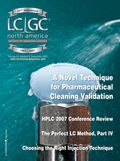Peaks of Interest
The Pittsburgh Conference announced that Dr. Leroy Hood will deliver the plenary lecture, Systems Biology and Systems Medicine, during the opening session of Pittcon 2008 at the Ernest N. Morial Convention Center, New Orleans, Louisiana on 2 March 2008.
Leroy Hood to deliver plenary lecture at Pittcon 2008
The Pittsburgh Conference announced that Dr. Leroy Hood will deliver the plenary lecture, Systems Biology and Systems Medicine, during the opening session of Pittcon 2008 at the Ernest N. Morial Convention Center, New Orleans, Louisiana on 2 March 2008. The opening session agenda will begin with the presentation of the Pittcon Heritage Award to Michael W. Hunkapiller, former president of Applied Biosystems (Foster City, California). The session will continue with the plenary lecture, a poster session, and a complimentary mixer.
Dr. Hunkapiller was a pioneer in protein sequenators, DNA analysis, synthesizers, and other gene measuring instruments while doing research at Cal Tech where he worked with Leroy Hood in the early 1980s. He joined Applied Biosystems in 1983 when it was a start-up company trying to commercialize the DNA sequencing machine and other machines as chief scientist and later as president. His work was key in allowing others to do gene analysis and in genomics programs.
Dr. Hood, president of the Institute for Systems Biology, earned an M.D. from Johns Hopkins School of Medicine in 1964 and a Ph.D. in biochemistry from the California Institute of Technology in 1968. Dr. Hood has focused his research on fundamental biology and on bringing engineering to biology through the development of five instruments-the DNA and protein sequencers and synthesizers and the ink-jet oligonucleotide synthesizer for deciphering the various types of biological information.
Among his many accomplishments and affiliations, Dr. Hood was elected to the Inventors Hall of Fame, received 14 honorary degrees from Institutions such as Johns Hopkins, UCLA, and Whitman College, published more than 600 peer-reviewed papers, received 14 patents, and co-authored textbooks in biochemistry, immunology, molecular biology, and genetics.
LECO opens life sciences center
LECO Corporation (St. Joseph, Michigan) relocated its Separation Science group to a new Life Sciences & Chemical Analysis Center. The 11,500 square foot building is now LECO's world headquarters for separation science sales and applications-providing support, method development, sample analysis, and instrument demonstrations to new and current customers. In addition to offices and cubicles, the center has several conference rooms and classrooms equipped with the latest technology designed for customer training and demonstrations. The center is located on Hilltop Road in St. Joseph, just a quarter mile west of LECO's main administration building.
Arnel opens Thailand office
Arnel Inc. (Parlin, New Jersey) opened a sales office in Bangkok, Thailand. The office will feature consultation facilities and appropriate demonstration equipment as well as house administrative personnel in support of Asian operations.
Clarence Wentzel, president of Arnel, said, "Providing local level sales and support for our customers has always been a top priority at Arnel. With the opening of our new office in Bangkok we will not only be able to demonstrate the wide variety of products we offer but also offer the expertise to better assist customers throughout Southeast Asia."
Arun Kanchanawat has joined Arnel and has been named the General Manager of the new office.
"We are pleased to welcome Arun to Arnel and are extremely excited about the wealth of chromatography experience and management knowledge that he brings," stated Wentzel.
Agilent collaborates with research center
Agilent Technologies (Palo Alto, California) and the National Jewish Medical and Research Centre (Denver,Colorado)announced a collaboration to provide applications-focused technical training in the field of systems biology. The alliance unites Agilentproducts for proteomics, genomics, and metabolomics with one of at the nation's premier respiratory hospitals.
Nichole Reisdorph, assistant professor of immunology and director of the National Jewish mass spectrometry facility, leads the training programs, which include e-seminars over the Web, hands-on application training, and classroom instruction.
The courses, which are open to the public, include "Hands-on Metabolomics and Proteomics Workshop" as well as database-searching and clinical-proteomics programs, among many others. Information about the National Jewish's growing curriculum of novice, intermediate and advanced courses is available at www.systemsbiologytraining.org.
Characterizing Plant Polysaccharides Using Size-Exclusion Chromatography
April 4th 2025With green chemistry becoming more standardized, Leena Pitkänen of Aalto University analyzed how useful size-exclusion chromatography (SEC) and asymmetric flow field-flow fractionation (AF4) could be in characterizing plant polysaccharides.
Investigating the Protective Effects of Frankincense Oil on Wound Healing with GC–MS
April 2nd 2025Frankincense essential oil is known for its anti-inflammatory, antioxidant, and therapeutic properties. A recent study investigated the protective effects of the oil in an excision wound model in rats, focusing on oxidative stress reduction, inflammatory cytokine modulation, and caspase-3 regulation; chemical composition of the oil was analyzed using gas chromatography–mass spectrometry (GC–MS).










